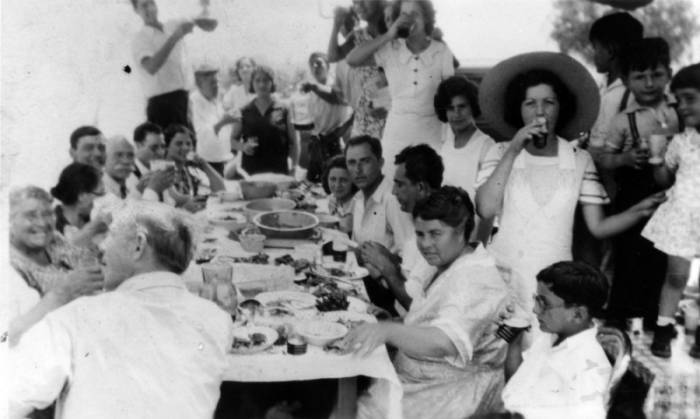Luisa Giulianetti's "Agrodolce"
Luisa Giulianetti, author of the collection of poems entitled Agrodolce, has lived in the Bay Area her entire life and often refers to her nonna’s kitchen as being her first classroom (p. 77). Giulianetti demonstrates her connection to her Italian roots and what it means to her to be Italian American clearly throughout the collection of poems. Consistent with the title, which translates to “bitter-sweet” or “sour-sweet”, Giulianetti’s poems cover ideas ranging from the feeling of cultural connectedness that traditional food preparations can bring, to grieving for one’s homeland and loved ones. Giulianetti’s poems greatly encapsulate the centrality of food in Italian culture not only through the growing and preparation of food but also through the meaning of food to many Italian Americans as being an expression of love. In an interview, Giulianetti attributes this centrality to how Italy was formed as a nation through the Risorgimento and the continued existence of regional pride even after Italy became a country. This regionalism travelled with Italian immigrants to the United States, where she states that “food became a way to preserve traditions from home” and a method of maintaining that regional sense of pride.
Furthermore, food being a way to express love in Italian American culture is greatly demonstrated in Agrodolce, largely through the first poem in the collection entitled “Kneading” which focuses on Giulianetti’s memories of making bread with her Nonna. However, Giulianetti also makes it clear that for her Nonna, and for many other first-generation Italian Americans, food was not only an act of love, but also an act of survival. In the essay entitled “Red, White, and Boiled,” Giulianetti states that for her nonna, “cooking for, and sharing food with her family was an act of love. A testament to survival” (p. 77). In this essay, Giulianetti describes the hardships her nonna has faced in her life, such as losing three children before having Guilianetti’s mom and uncle and losing her husband shortly after leaving her homeland of Sicily behind. She shares that her nonna was almost obsessive over her and the rest of her family while she was growing up, as if cooking for her acted as “a way to literally and symbolically nourish us … and stay connected to the land she regrets leaving.” This recollection of her nonna’s experience demonstrates the struggles many Italian immigrants faced after leaving Italy, between personal hardship, assimilating in a new country, and trying to re-create home to cope with the difficulties of the immigrant experience.
This experience of grieving for one’s homeland is further highlighted through Giulianetti’s poem entitled “Pasta con Finocchietto,” which discusses her nonna’s preparation of a traditional Italian dish to honor her homeland (Agrodolce, p. 54-55). In the poem, Giulianetti mentions that “finocchietti are wild . . . they shoot up in empty lots, fields, cracks in the road,” (Agrodolce p. 54). This can be interpreted as an homage to the Italian immigrant experience of taking up “less noticeable” spaces, and job positions, such as through fishing, working in canneries, cleaning up garbage, or selling fruit, as many Italian Immigrants in California took on. Later in the poem, Giulianetti states:
“displacement lives on fingertips tipped by knife cuts. On the unsated tongue. Even after thirty years and three cities, the body knows what it knows. What it lacks: Mount Etna silting stems. The Mediterranean brining her (her nonna’s) mouth” ( Agrodolce, p. 55).
The poem’s message of grieving Italy and her nonna’s attempts to remain in touch with her Sicilian roots through food is beautifully demonstrated and is a testament to the power food writing can hold in sharing the deeper meaning of food preparations and the memories they represent.
Credit: Faith Fitzpatrick

